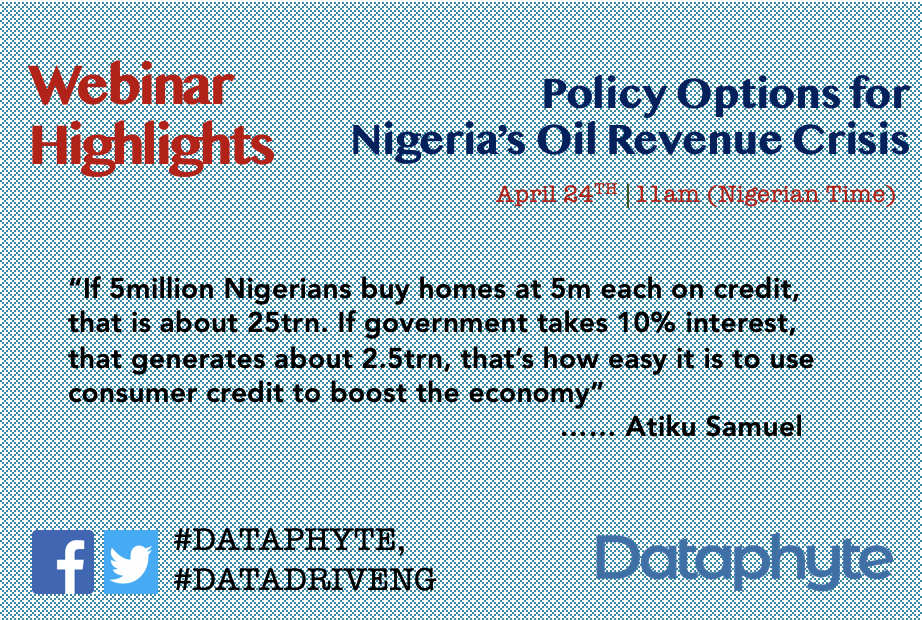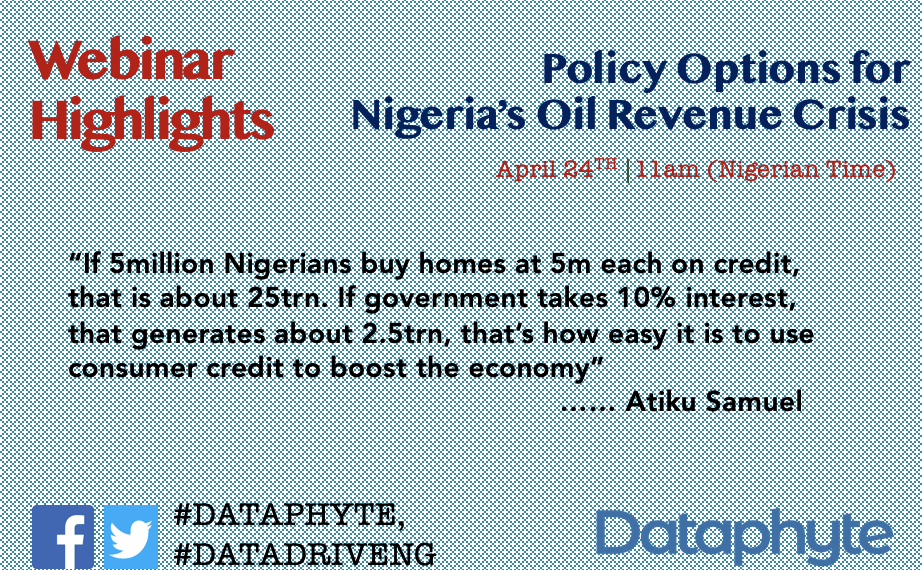Nigeria is indeed in a bad form. As COVID19 has made the world shut down, demand for oil has dwindled. This has affected the oil market. Crude oil constitutes 80% of Nigeria’s revenue and the country did not grow the capacity to collect taxes when it could.
The more dire reality is that revenues are almost non-existent for the country. In January, crude oil sold for $70 per barrel; until it dropped below $50 per barrel. A few days ago, the Bonny Light sold for about 5 or 6 dollars per barrel. Moreso, Nigeria has 70 to 75 cargoes on the sea that it is unable to sell. Each vessel has about 950,000 barrels.
The fear of decreased consumer spending is another issue. Citizens are realising cash is key in times like this and are withholding it due to their uncertainties about what lies ahead. This gives the government a few transactions to tax. The small and medium scale businesses are practically shut down and cannot generate money. Thus, cannot pay taxes from zero profit.
The way out of the conundrum was the daunting task for the panellists at the Dataphyte Webinar Series held on April 24. The topic of the online panel was ‘Policy Options for Nigeria’s Oil Revenue Crisis’. The panellists were Ronke Onadeko, Samuel Atiku and Patrick Okigbo III.
The Webinar, the second edition was powered by Dataphyte, a data as a service programme of the Interactive Initiative for Social Impact, founded by Joshua Olufemi. Joshua Olufemi is a media development expert who successfully designed the media sustainability framework for the renowned Premium Times Centre for Investigative Journalism as the Program Director. He also led the Knowledge and Innovation unit of Premium Times.
Increasing Consumer Credit Is A Great Way Out.
For Samuel Atiku, a public policy analyst, injecting more money as an expansionary measure must go together with increasing consumer credit to cushion inflationary pressure that accompanies expansionists policy.
Nigeria could raise at least N2.5 trillion revenue increasing consumer credit in the housing sector alone. For instance, “if the mortgage industry sells 5 million houses at an initial N5million deposit, that will generate N25 trillion. With a 10% VAT, the government would generate N2.5 trillion cool cash revenue”. said Samuel Atiku, who is a senior project officer at the International Budget Partnership.

Dataphyte analysts estimated that 5 million houses will reduce the current housing deficit by 30%. This would provide shelter for about 20 million Nigerians that need decent homes.
Also, look at the number of potential jobs in order to provide these 5 million jobs. Imagine the government’s plan to employ 774,000 sanitation officers. What if they are trained to mould bricks? The sustainable informal sector empowerment it will bring to the building and constriction industry.
Also, a well-structured housing scheme would create at least additional 10,000 primary health centres and 10,000 primary schools. This is achievable if every 500-house scheme is mandated to incorporate a clinic and a school in the basic infrastructure.
Think of the shopping malls that would come with the estates. Calculate the sales taxes for governments. Also, the new road networks. Moreover, added health and educational infrastructure. Not to mention, the growth of SME subsector.
Nevertheless, coming out of the economic depression requires first thinking within the box. The federal government does not need to hurry to its regular lenders, it should look at the rudimentary factors of growth through spending, says Abdul Elayo, an Economist and civil servant.
Gloomy Economic Indices
The Nigerian economy is at a point where the budget is in trouble, the state governments are in trouble, and so is the Federal Government. Foreign currency reserves have dropped drastically. The reserve dropped to $33 billion from the $60 billion it was five years ago. This reserve is supposed to support several months of import but the reality on the ground may not last beyond 10 months.
Likewise, the excess crude account is down from $2.1 billion to about $70 million. Travel back to 2009, Nigeria had about $20 billion in its excess crude account. Then, it was able to cool the storm.
The truth is Nigeria was in its fiscal storm and was drowning in debt before the emergence of Covid-19. For instance, Foreign loans had increased from $7.4 billion in 2015 to about $23 billion in 2019 and the Federal Government still needs to borrow about $7 billion this year to keep all the balls up in the air.
According to a DWS panellist, Ronke Onadeko, an Oil and Gas expert, Nigeria is not a country with an agricultural base. Otherwise, the country would export products that have value-add rather than the raw forms the products are shipped out.
“We have very little infrastructure to help aid the production of raw materials, there are no good power supply, no good internet, good transportation system, and many more. This is quite an uncomfortable and untidy landscape in terms of infrastructure.” she further said.
More Recurrent and Overhead Spending
Another scary reality is that the country is running about 86% recurrent budget. Breaking it down, 40% is used to service debt. Then 38% is used to settle public appointees or public servants and then 8% is spent on overhead.
Even though they are contestable, the estimated number of civil servants in Nigeria is about 1.2 million. These much depend on the governments for their wages. At the same time, the state governments depend on the federal government to provide for them.
The twist to this is a situation where the federal government is unable to pay their civil workers. This would lead to low consumer spending for about 1.2 million persons. In this case, revenues cannot be efficiently generated and the poverty that will result is better imagined.
FAAC is a Problem and Needs Rethinking
A scenario where all 36 states come to the federal government to share revenue is a big challenge. Just in February, states walked off the meeting because the revenue cake was not palatable. President Buhari had to take $150 million from the stabilization fund to augment the FAAC.
For Samuel Atiku, a public policy analyst, to increase revenue is to look into the existing revenue frameworks. In simple terms, look at the federation account (FAAC) revenue and determine to create immediate adjustments. Otherwise, there are little options for coming out of the revenue conundrum.
States need to do a comparative advantage analysis. Then begin to key into sectors that can help them generate more internally generated revenue(IGR). Ogun, Lagos, Kebbi and Kano have shown prospects of states that are working their IGR up and may not be totally hit by the oil revenue crisis.
Also, Gas is What We Have in Abundance
Gas is, in fact, the greatest resource in Nigeria, says Ms Onadeko. The challenge, however, is that we do not have the infrastructure to develop this resource. Nigeria needs not to export its gas but to harness it for optimal revenue generation.
The task for the government is to develop the gas industry. To take in more revenue, the government needs to invest more in SME enterprises in Nigeria. This would help to resolve the issue of low consumer spending, unemployment rates while positioning the gas industry as a revenue source
Conclusion
In summary, cut down state recurrent expenditure and increase consumer credit. Build infrastructure to boost agriculture and utilisation of the gas. Also, the federal government needs to incentivise state governments to generate revenue internally. That will sustain them beyond the federal allocation.



